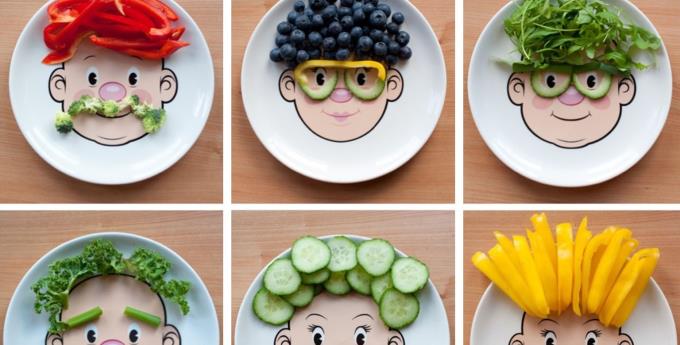Ways to determine an infants caloric needs

Learn how to determine your baby’s caloric needs, including the calories in breast milk and formula, to ensure your infant gets the right nutrition for healthy growth.
Caring for and raising an anorexic child is the hard work of many parents. When your baby has anorexia, you tend to force him to eat. This often does not yield satisfactory results. Find out what the cause of your child's anorexia is to have appropriate solutions.
The fact that children eat less sometimes is simply because the child does not like the food, not because of anorexia. Did you know that childhood anorexia can be caused by psychological causes and negatively affect young children. If you have a child with anorexia, you should learn about this disease to help your child overcome.

Anorexia in children is a common eating disorder in young children, a very common condition among children aged 1 to 6 years. Children anorexia when refusing to eat or eat less or not eat enough nutrients needed. Anorexia children often have the following symptoms:
The baby cries or tries to disturb you when you serve the food.
Children do not eat certain foods or eat all foods.
Keep food in mouth for a long time, refrain from chewing or swallowing.
Eat less than usual.
The duration of each meal is usually long.
Anorexia rates are more common in girls than in boys.
Children with anorexia are often at risk for developmental delay compared to other children of the same age.
Anorexia can lead to malnutrition in children .
Children with anorexia are prone to health problems such as digestive disorders, anemia, decreased bone density and hormone imbalance.
Anorexia children are often obsessed with food and body weight.
The causes of anorexia in children are often:
Bad habits created by parents unintentionally for children are often the cause of anorexia. For example: the meal time is long, you often pamper your child so let them suck on food for a long time or swallow without chewing. These may lead to children wanting to eat only liquid foods, being afraid to swallow, and disliking more coarse foods that need to be chewed such as: rice, vegetables, meat, fish ...
Sometimes you are not feeding your baby at the right time, as often forcing him to eat while he is still full. This creates a bad impression on the child's mind, making the child not feel full or really hungry. The real feeling of fullness and hunger in children is only when you let them eat when they want. There are cases when children do not have anorexia, parents become discouraged, leading to hesitate to prepare food for children and to feed the children with adult food.
Some families allow their children to turn on the television or play with toys while eating to make them happy. Moreover, there are mothers carrying their children around the neighborhood with a bowl of porridge in hand. This is not good for children because they do not focus on eating or forget about the cravings. Over time this can cause anorexia in children.

This is a bad habit that leads to anorexia in children. Parents often pampering their children, feeding them their favorite foods for a long time can make babies picky eats. Over time, this can lead to a nutritional imbalance due to not eating enough nutrients and the child will refuse to eat nutritious foods that the child does not like. However, even if they eat their favorite foods, they may also be anorexic because eating one dish too many times makes them bored.
Some parents are not patient when feeding their children, so sometimes they will yell at times when the child does not want to eat or eat slowly. This may scare the child, resulting in anorexia.
Unlike adults, the feeling of hunger in young children is often not so obvious. Therefore, you should not force your child to eat when he or she is not really hungry. In addition, you should not let your child eat alone, let your child eat with family meals. This helps children to eat well, do not feel alone when eating.
Like us, if we are not well, our children will also have anorexia
Children have anorexia teeth because of painful swollen gums that make it difficult for them to chew food.
Children are suffering from digestive disorders , abdominal pain, nausea, diarrhea or constipation.
Children become infected by viruses or bacteria. Children can get infections such as ear, nose, throat, eyes, intestinal infections causing cough, fever, fatigue ... leading to anorexia.
The fact that parents see their children eat less than children of the same age should try to force their children to eat, making them afraid of eating, developing anorexia mentality.
Mental problems can cause eating disorders in young children. This makes children lose their appetite for healthy foods.
Children with anorexia often have different personality and behavior traits from other children.
Babies with a lack of appetite tend to be depressed and have difficulty overcoming stress.
Children still try to control emotions and are under pressure to gain weight.
Having to endure unpleasant feelings makes children feel stressed, so children often develop anorexia psychology. For example, sexual abuse, pressure on grades in school, exams ...

Hormonal changes that happen in teenagers, especially during puberty, can also make them feel less like eating. This is called puberty anorexia.
Academic stress or stress in school relationships can lead to a child's loss of appetite.
When children practice too strenuous exercises such as gymnastics, athletics or participating in vigorous games, they can also make them feel less appetite.
Something sad like a family member dies or parents divorce… can also make children lose their appetite.
Researchers suggest that anorexia tends to be inherited.
Children born in families with a history of chronic diseases such as arthritis, colitis , kidney failure, cirrhosis ... have a higher risk of anorexia than others.
You should estimate the child's necessary caloric intake in a day to know how much he eats enough, avoiding forcing the child to overeat. Each baby needs a different amount of calories depending on the following 3 factors: age, gender and health status of the child.
You can refer to the article " Nutrition pyramid for children from 3 to 11 years old " to know how many calories your child needs and how much food he needs to consume / day.
Children with anorexia often grow slowly, with poor resistance making parents worried. If there is an anorexia, you should refer to the following 8 tips to stimulate the child's appetite:
Measures such as threats, punishment, scolding, and even beating all make the baby's anorexia worse.
If you want to introduce new foods to your baby, offer them breakfast. This is the time when your baby feels most hungry for the day and is ready to try a new food. Once your baby is ready to eat, you can move the food into the lunch or dinner menu and prepare another new dish for the next breakfast.

In each meal, there should be at least one food that your baby likes that can stimulate the child's appetite.
Let your child choose what he or she likes to eat as long as the food doesn't harm him or her.
Encourage your child to eat all the dishes on the table, even if only a little.
Make it a rule for your child not to eat anything at ease without snacks and meals.
10–15 minutes before starting a meal, let your baby know it is time to eat.
Most children like to imitate the actions of others. So, parents should eat on time, be a good example for babies in eating healthy foods .
The whole family gathering together on the tray of rice and having fun talking while eating helps the baby eat better.
If your baby is fasting, divide your baby's meals into parts and feed them little by little at certain times.
You can give your child snacks at snacks such as yogurt, fruit, and less sweet cakes, but should not be fed close to the main meal.
Children drinking too much before and during meals will make them feel full and no longer interested in eating.
In addition, you need to limit feeding your baby in the middle of the night because it will affect the next morning's breakfast.

Children love to make decisions about what to eat. You should discuss with your baby what next meal will eat and then choose foods to have a balanced meal.
Encourage your baby to help you pick up vegetables, wash vegetables, mix food, set the table for the whole family. These things will stimulate your baby to want to eat the foods he has helped to cook.
One of the things you have to make sure is that the food your child eats is nutritious. The vitamins and minerals in the diet can stimulate a child's appetite.
Example: Many studies have demonstrated, zinc can help stimulate appetite in children. Foods that contain zinc are beef, chicken, fish and a variety of dark green vegetables.
In addition, you need to pay attention to the following issues to stimulate your child's appetite:
Do not let your baby use cell phones, toys, reading / reading manga, watching television or using other technology devices while eating.
Absolutely do not use food as a reward in order to avoid psychological arising because it is rewarded to eat, not because the baby likes that food or that food is good for health.

A child who is sedentary can also cause anorexia. You should encourage your baby to be active every day. If possible, take some time to be active with your baby. You can walk, jump rope, play tag, play soccer ... with your kids. The exercise makes the baby consume a lot of energy, so the baby will feel hungry, eat better and have better health.
If the baby is young, you should massage him. This helps the baby's digestive system work better, contributes to the restriction of gastrointestinal diseases to help children stay healthy and grow well.
Do not impose prejudice on your child that eating candy, snacks or fast food is bad, eating vegetables or fruits is good. It is important that you talk to your child to understand that food is full of nutrients. The foods that babies should eat are fruits and vegetables, whole grains and meat, fish, legumes ...
You can eat potato chips, snacks, candies… on special occasions like going to the movies or birthdays.
Vitamins and minerals play an important role in helping the body function properly. The supplements for children with anorexia provide many vitamins and minerals necessary for the child's development. But if you are following a healthy, balanced diet for your baby, there is no need to take extra vitamins. And the need for anorexia for children to take supplements requires the appointment of a doctor.
Hopefully the above sharing will provide more useful information for your family's parenting guide, helping you to have suitable solutions for children with anorexia.
Learn how to determine your baby’s caloric needs, including the calories in breast milk and formula, to ensure your infant gets the right nutrition for healthy growth.
Discover the top 5 smartest dog breeds in the world, including Border Collie, Poodle, German Shepherd, Golden Retriever, and Doberman Pinscher. Learn about their unique traits and why they are considered the most intelligent dogs.
Discover 7 nutritious and delicious ways to cook egg porridge for babies, including recipes with cheese, pumpkin, tomato, and more. Learn how to prepare baby-friendly egg porridge with our expert tips.
After a series of medical measures they obtained a complete human vascular system profile.
Watermelon is one of the fruits that many people love, not only cheap but also delicious, nutritious and refreshing in the summer. To get delicious watermelon pieces, show off your housewives, your artistic talents to cut beautiful pieces of watermelon.
aFamilyToday Health - The digestive system and body in each baby is different. Parents need to recognize notes to deal with when babies have a food allergy!
Babies need many factors for perfect development. aFamilyToday Health shares with parents things to keep in mind when babies are 8 weeks old so that parents can take care of their babies the best!
Babies need many factors for perfect development. aFamilyToday Health shares with parents things to keep in mind when babies are 18 weeks so that parents can take care of their babies the best!
Babies need many factors for perfect development. aFamilyToday Health shares with parents things to keep in mind when babies are 28 weeks old so that parents can take care of their babies the best!
Babies need many factors for perfect development. aFamilyToday Health shares with parents things to keep in mind when babies are 32 weeks old so that parents can take care of their babies the best!








